
Similar Posts

Iran and Germany Forge Stronger Ties: Trade Turnover Reaches €1.5 Billion in 2024
In 2023, trade between Iran and Germany surged to €1.45 billion, reflecting strengthened economic ties, particularly in industrial equipment and machinery. In 2024, Germany’s exports to Iran reached €1.28 billion, a 6% increase from the previous year, with December alone seeing €134 million in trade, a 1% growth. Key exports included industrial equipment (€520 million), machinery, and automotive parts. Factors driving this growth include enhanced economic cooperation, a diverse product range, and strategic partnerships. As relations evolve, both nations are likely to pursue further collaboration, aiming to expand trade opportunities and support Iran’s industrial development.

Ex-Banker Reveals Non-Oil Sanctions Impose $500 Annual Burden on Every Iranian
International sanctions have severely impacted the Iranian economy, costing each citizen around 530 million rials ($500) annually, particularly in the non-oil trade sector, according to former Central Bank Governor Mohammad Hossein Adeli. Traders incur a 10% to 20% markup on goods due to sanctions, often using shell companies to disguise import origins, inflating prices by nearly 30%. Iran’s foreign trade volume is about $150 billion for the 2023-2024 fiscal year, with sanctions-evasion costs potentially reaching $50 billion. Additionally, a projected $13.5 billion loss in oil export revenue further exacerbates the economic strain on families, highlighting the urgent need for reforms.

Iran’s Major Crackdown: 240,000 Cryptocurrency Mining Rigs Seized in Bold Move
Iran is grappling with electricity consumption challenges exacerbated by cryptocurrency mining, prompting authorities to seize over 240,000 mining devices in three years. These rigs reportedly consume 800 megawatts, similar to the Bushehr nuclear power plant’s output. Tavanir estimates around 700,000 illegal rigs still operate, consuming 2,000 megawatts. A projected 25,000-megawatt electricity deficit looms for the next year, representing nearly one-third of national consumption. Authorities emphasize the need for stricter regulations and collaboration with law enforcement to combat illegal operations, aiming for a balanced approach to cryptocurrency mining that ensures energy sustainability.

Tehran Welcomes the 3rd Caspian Economic Forum: A Gateway to Regional Economic Collaboration
The Caspian Economic Forum, a two-day event, aims to enhance economic cooperation among Caspian Sea littoral states. Key discussions focus on healthcare, energy, finance, tourism, and investment in free trade zones. Under the motto of fostering trade, the forum addresses industrial collaboration, customs, transportation, environmental issues, and scientific cooperation. Outcomes will be presented at a prime ministers’ meeting, aiming to finalize a statement that outlines strategies for sustainable growth. This gathering serves as a vital platform for aligning economic interests, promoting investment, and addressing regional challenges, ultimately fostering collaboration for a prosperous future in the Caspian region.

Iran Launches New Trade Center in Minsk, Boosting Economic Ties with Belarus
Iran’s Minister of Industry and the Chief of the Trade Promotion Organization convened an expert meeting to enhance trade with Belarus. Key proposals included improving trade facilitation, conducting market research on in-demand products, developing logistics solutions, establishing favorable financial mechanisms, and simplifying regulations. The discussions emphasized collaboration to address challenges such as regulatory barriers, logistical issues, and market competition. Strengthening ties with Belarus is vital for diversifying export markets, increasing revenue, and fostering strategic partnerships. The proactive approach aims to create a robust economic relationship, positioning Iranian businesses for success in the Belarusian market.
